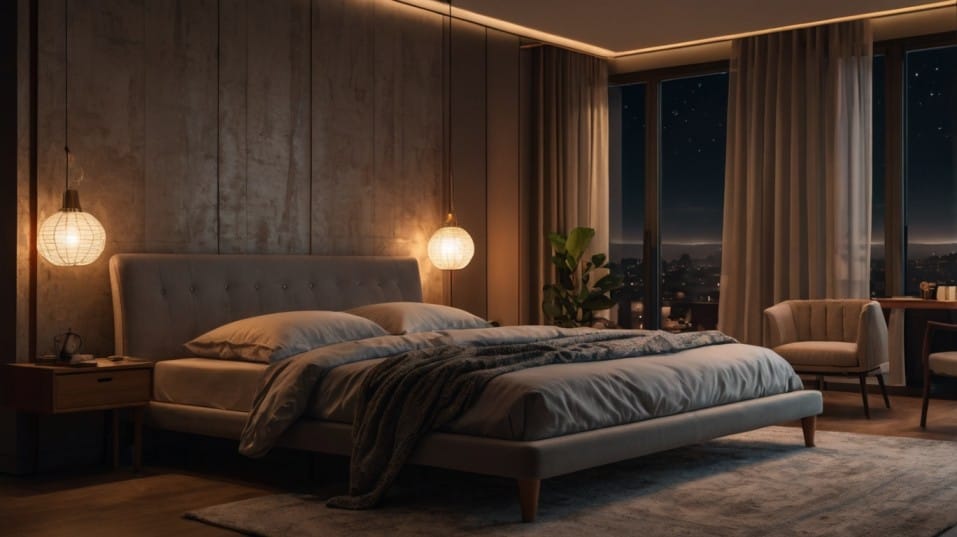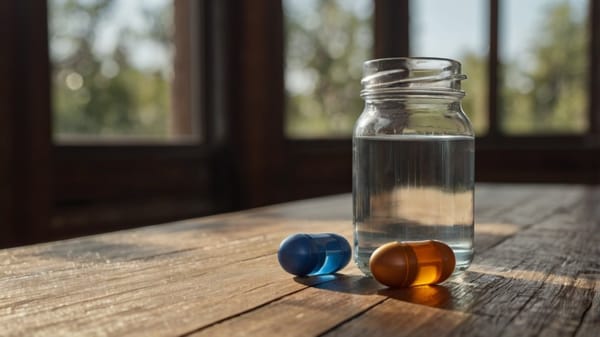Want Deeper Sleep Without Knocking Yourself Out? Here’s What Works
Still waking up tired after 8 hours? Here’s how to sleep deeper naturally—without grogginess, sedatives, or knocking yourself out.

Ever wonder why you wake up tired even after a full night in bed? You didn’t toss and turn, yet your body feels heavy and your mind’s still groggy. The problem isn’t how long you sleep—it’s how deep.
Most sleep aids knock you out but skip the part where your body actually recovers. The real fix? Stop sedating yourself and start supporting your system to unlock natural, restorative sleep.
Why Deeper Sleep Matters More Than “Knockout” Sleep
Not all sleep is created equal. You cycle through light sleep, REM, and deep sleep multiple times each night—but it’s that deep, slow-wave sleep where real recovery happens.
That’s when your brain clears waste, your muscles repair, and your hormones reset. It’s also the phase most commonly missed when you rely on sedatives or over-the-counter sleep meds.
What many products do is sedate you. They force your body into stillness but short-circuit the natural rhythms that lead to real rest.
You may be unconscious, but your brain isn’t hitting those crucial recovery stages. You’re asleep, but you’re not healing. The fix? Work with your body—not against it.

First, Support Your Nervous System
Deep sleep doesn’t come from drowsiness. It starts with a calm, balanced nervous system. If your body’s stuck in fight-or-flight mode, it’s not going to downshift into quality rest—no matter how tired you feel.
The trick is to create the conditions that let your body do what it already wants to do.
Try These Natural Calmers:
- Magnesium glycinate or threonate – These forms help ease muscle tension and quiet the mind, without acting like a sedative.
- L-theanine – This amino acid promotes alpha brain waves (the relaxed, alert state) and helps reduce nighttime anxiety or overstimulation.
- Ashwagandha (in small doses) – Useful for lowering evening cortisol levels if your stress peaks at night.
Take these 60–90 minutes before bed to give your body time to shift gears. Pair it with a warm shower, cozy lighting, or even five minutes of slow breathing, and your nervous system will start to unwind automatically.
Layer in Light, Targeted Sleep Support
You don’t need a giant stack. You just need the right tools to nudge your sleep cycles in the right direction—without overwhelming your system or leaving you groggy.
What Works Well Together:
- Low-dose melatonin – Not for knocking you out, but for realigning your internal clock (especially if you have trouble falling asleep). Less is more here—0.3 to 1mg is plenty.
- Glycine – This amino acid helps drop core body temperature and deepen sleep. Bonus: it can also improve next-day alertness.
- Apigenin – Found in chamomile, this flavonoid supports GABA activity and eases the transition into sleep.
- GABA (as PharmaGABA) – Supports mental stillness without pushing sedation.
These supplements don’t force sleep—they clear the path so your body can move into it more easily. They’re best used consistently and timed properly.
Get Your Timing Right
You can take all the right ingredients—but if your timing’s off, your results will be too. Sleep is tied to your circadian rhythm, and most of these supplements work by syncing with it—not overriding it.
Here’s a flow that actually works:
- 90 minutes before bed: Take magnesium and L-theanine.
- 45 minutes before bed: Add apigenin or glycine.
- Only if needed: Take a small dose of melatonin around 90 minutes before your ideal bedtime.
Think of it like a dimmer switch—not a light switch. The goal is to gradually wind down, not to crash. You’re creating a slow descent into sleep, which sets you up for depth and quality—not just duration.
Ditch the Stimulation—Physical and Mental
Your sleep supplements can only do so much if your environment is working against you. Light, noise, stimulation, and even mental clutter can keep your brain in alert mode long after your body’s ready to rest.
Optimize Your Environment:
- Cool your room: 60–67°F (16–19°C) triggers natural melatonin production.
- Blackout curtains: Light—even from streetlights or a phone notification—disrupts melatonin.
- White noise or earplugs: Block external disruptions and help your brain feel safe enough to release control.
- Screen off an hour before bed: Blue light delays melatonin release, and scrolling adds unnecessary stimulation.
Just as important—quiet the mind. If your thoughts race at night, try journaling for five minutes. Get the thoughts out of your head so they stop bouncing around. Or do a short body scan to bring awareness out of your brain and into your body.
Build a Repeatable Routine
The real secret to deep sleep? Consistency. The body craves rhythm. You can have the perfect supplements and environment, but if your bedtime changes constantly, your body never learns when to wind down.
Pick a 90-minute wind-down window and keep it the same every night. Whether it’s 9:30 to 11:00 or 10:00 to 11:30, consistency sends the strongest signal to your system: it’s time to rest now.
Over time, your body starts to expect sleep—and responds faster, deeper, and with more recovery.
Final Thoughts: You Don’t Need to Force Sleep—You Just Need to Support It
Deep sleep doesn’t come from chemical knockouts or chasing the latest miracle pill. It comes from alignment. When you give your body the signals, space, and support it needs, restorative sleep happens naturally.
You don’t have to overhaul your life—just pick a couple of shifts to start with tonight. Try magnesium and L-theanine. Dim the lights. Skip the scrolling. Set a bedtime you can stick to. Let your system find its rhythm again.
Start now: You don’t need to feel “exhausted enough” to earn deep sleep. You just need the right tools, in the right order. Stack smart. Sleep deeper. Wake up actually rested.




